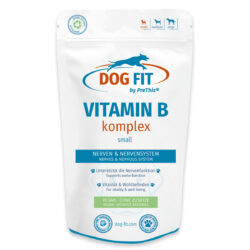Vestibular syndrome in dogs

What is Vestibular Syndrome?
Vestibular syndrome is a neurological disorder that affects the dog’s balance system. Typical symptoms include a sudden tilt of the head, coordination problems, staggering, dizziness, rolling movements, and eye tremors (nystagmus). The appearance can be dramatic but is not necessarily life-threatening. Older dogs are most commonly affected, although vestibular syndrome can also occur in younger animals.
Causes of Vestibular Syndrome
Basically, two forms are distinguished:
- Peripheral Vestibular Syndrome: Most common form, triggered by diseases of the balance organ in the inner ear. Possible causes: inflammation of the ear (e.g., internal otitis), injuries, certain medications, or idiopathic triggers.
- Central Vestibular Syndrome: Less common, but more serious. The cause lies in the central nervous system, for example, tumors, infections, strokes, or inflammatory diseases in the brain.
A special form is the so-called idiopathic vestibular syndrome, which occurs suddenly without any identifiable cause – often in older dogs. In these cases, the prognosis is often favorable; many animals recover completely or largely within a few days to weeks.
Recognizing Symptoms
The clinical signs can vary greatly in severity. The most common symptoms include:
- Head tilt
- Unsteady or unsteady gait
- Circling or staggering
- Nausea or vomiting
- Eye tremors (nystagmus)
- Disorientation
In severe cases, dogs refuse to eat, lie apathetically, or appear extremely unsettled.
Diagnosis and Veterinary Evaluation
Since the symptoms of vestibular syndrome can also occur with other neurological or orthopedic disorders, veterinary evaluation is essential. Neurological examination, blood tests, and imaging procedures (e.g., MRI) can help narrow down the cause.
Supportive measures in everyday life
Even though most dogs recover well from vestibular syndrome, supportive care in everyday life is helpful:
- Quiet environment without many stimuli
- Non-slip bedding and a secure place to lie down
- Place food and water bowls within easy reach
- Support when getting up and walking
In consultation with your veterinarian, physiotherapy may be helpful to improve coordination and prevent relapses.
